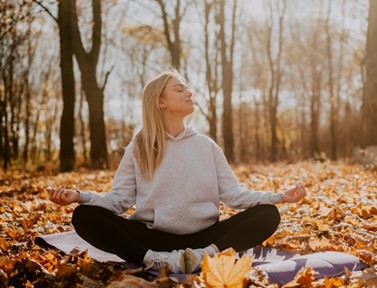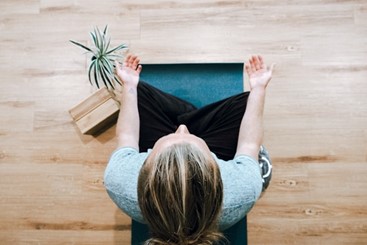Dr. Kelly Roan of Ohio is a medical professional in emergency medicine and healthcare management. With a background in biology from the University of North Texas and a Medical Degree from the University of North Texas Health Science Center’s Texas College of Osteopathic Medicine, Dr. Roan has experienced firsthand the stress and demands of the healthcare field. Through his career, he has come to understand the crucial role that mental health and wellbeing play in the lives of both healthcare professionals and the patients they serve.
In this article, Dr. Roan delves into the transformative impact of mindfulness and meditation on mental health and wellbeing. He explores how these practices, rooted in ancient traditions, have become powerful tools for reducing stress, enhancing focus, and improving emotional regulation. As a healthcare practitioner, Dr. Roan believes that adopting these practices can bring profound benefits not only to medical professionals but to anyone seeking greater balance and peace in their lives.
Discover more below on how these techniques can positively impact your mental health and overall wellbeing. Through a combination of scientific research and practical advice, Dr. Kelly Roan of Ohio offers a compelling perspective on why awareness and reflective practices are gaining popularity as essential tools for navigating the challenges of modern life.
Origins
Meditation and mindfulness have roots in ancient spiritual and philosophical traditions that span thousands of years. Originating from Eastern cultures, these practices were integral to religious and spiritual paths, such as Hinduism, Buddhism, and Taoism. In Hinduism, meditation is a key component of yogic practices, aimed at achieving union with the divine. Buddhism popularized mindfulness through its teachings on “sati,” emphasizing awareness and presence in every moment. Moreover, Taoism incorporated meditation as a means of harmonizing with the natural order of the universe.
These ancient traditions understood that by cultivating inner peace and focused awareness, individuals could transform their consciousness, achieve spiritual growth, and lead more balanced, harmonious lives. Today, these age-old practices are celebrated for their capacity to improve mental health, connect with oneself on a deeper level, and overall wellness.
Dr. Kelly Roan Defines and Further Explains these Techniques
Mindfulness is the practice of being fully present and engaged in the moment, aware of your thoughts, feelings, bodily sensations, and surrounding environment without judgment or distraction. It involves observing these experiences as they happen, fostering an open and accepting attitude toward them. Mindfulness can be cultivated through various techniques, such as breathing exercises, mindful walking, or simply paying attention to everyday activities.
Meditation is a broader concept that encompasses a variety of techniques designed to train attention and awareness, fostering a calm and focused state of mind. Meditation can involve concentration on a specific object, sound, or breath, or it can be more open-ended, allowing thoughts and feelings to arise without attachment.
Dr. Kelly Roan of Ohio emphasizes that this isn’t a one-size-fits-all practice; it comes in many forms, each offering unique paths to mental clarity and inner peace. Among the most popular methods is mindfulness meditation, where the practitioner focuses intently on the present moment, observing their thoughts and feelings without judgment. This approach can lead to a profound sense of calm and heightened awareness.
Mantra meditation, on the other hand, involves the repetition of a specific word or phrase, creating a rhythmic pattern that helps clear the mind and foster deep relaxation. Loving-kindness meditation is about cultivating compassion and empathy, as the individual directs positive energy inward and towards others, often resulting in a greater sense of connection and well-being.
Additionally, transcendental meditation takes a different approach, using specific mantras to reach a state of deep relaxation and transcendence, allowing you to go beyond ordinary thought patterns. Dr. Roan points out that each of these techniques has its unique benefits, and choosing the right one depends on your personal preferences and goals. Whether you’re seeking stress relief, emotional balance, or spiritual growth, there’s a form of practice that can help you on your journey.

Why these Practices Are Gaining Popularity
Dr. Kelly Roan of Ohio reports that these exercises are increasingly recognized as powerful tools for improving mental health and overall wellbeing. Here’s why they are gaining popularity:
- Stress Reduction: Both of these techniques are effective at reducing stress by promoting relaxation and helping individuals respond to stressors with greater calm and clarity. This reduction in stress can lead to lower levels of cortisol, the stress hormone, which has numerous health benefits.
- Emotional Regulation: These techniques encourage individuals to observe their emotions without judgment, allowing them to better understand and manage their emotional responses. This emotional regulation can lead to improved relationships and decreased feelings of anxiety and depression.
- Improved Focus and Concentration: Meditation, particularly mindfulness meditation, helps train the brain to stay focused on the present moment. This improved focus can lead to increased productivity and better performance in various tasks.
- Enhanced Self-Awareness: These practices foster a deeper understanding of one’s thoughts, feelings, and behaviors. This increased self-awareness can lead to personal growth, improved decision-making, and a greater sense of purpose.
- Physical Health Benefits: In addition to mental health benefits, these practices have been linked to various physical health improvements, including reduced blood pressure, improved immune function, and better sleep quality.
- Accessibility and Adaptability: These exercises can be adapted to fit different lifestyles and preferences. They can be practiced in various settings, from formal meditation sessions to everyday activities, making them appealing to a wide range of people.
Dr. Kelly Roan of Ohio says that given these benefits, it’s no surprise that attention-focused techniques and relaxation practices are gaining popularity in modern society. Many individuals are seeking ways to manage stress, improve focus, and enhance their overall quality of life, and these practices offer simple, effective tools to achieve these goals. With growing scientific support and a range of accessible resources, conscious awareness is likely to continue playing a significant role in promoting mental health and wellness.
The Differences
These methods are closely related concepts, often used interchangeably, but they have distinct meanings and applications. While mindfulness is the practice of being fully present and aware, meditation is a broader set of techniques designed to achieve specific mental states or goals. Mindfulness can be part of meditation, and meditation can be a tool for developing mindfulness. Both practices offer valuable benefits, and their differences allow individuals to choose the approach that best suits their needs and goals.
The Benefits
Dr. Kelly Roan of Ohio notes that mindfulness and meditation have gained widespread recognition for their profound impact. These practices offer numerous benefits, from reducing stress and promoting relaxation to improving focus and emotional regulation.
One of the most significant benefits is their ability to reduce symptoms of anxiety and depression. Here’s how these practices help:
- Detaching from Negative Thoughts: Mindful awareness encourages individuals to observe their thoughts without judgment, creating distance from negative thought patterns. This detachment allows people to avoid getting caught in cycles of worry or rumination, reducing feelings of anxiety and depression.
- Encouraging Present-Moment Awareness: The practice of being mindful focuses on the present moment, reducing the tendency to dwell on past regrets or future anxieties. This shift in focus can alleviate depressive thoughts and foster a more positive outlook.
Stress reduction is another key benefit. These practices help lower stress levels in several ways:
- Activating the Relaxation Response: Meditation triggers the relaxation response, a physiological state that reduces stress hormones like cortisol and promotes a sense of calm. Techniques like deep breathing and progressive muscle relaxation can help counteract the fight-or-flight response often associated with stress.
- Cultivating Mindful Awareness: It encourages individuals to become aware of their stress triggers and develop a non-reactive attitude toward them. This awareness allows individuals to respond to stressors more calmly and avoid escalating their stress levels.
- Providing Tools for Stress Management: The practice of meditation provides a practical way to manage stress, such as visualization and guided imagery. These techniques can help individuals cope with challenging situations and reduce the impact of stress on their well-being. Dr. Kelly Roan says that mindfulness and meditation also offer cognitive benefits, including improved focus and concentration.
- Training the Mind: Techniques like focused attention and present-moment awareness train the mind to concentrate on a single point of focus, whether it’s the breath, a mantra, or an object. This focused attention enhances cognitive skills and improves the ability to concentrate on tasks.
- Reducing Distractions: It also reduces the impact of distractions by encouraging individuals to observe them without getting attached. This practice helps individuals stay on task, even in highly distracting environments.
- Promoting Cognitive Flexibility: Meditation can increase cognitive flexibility by allowing individuals to shift their focus as needed. This flexibility is valuable in problem-solving and adapting to changing circumstances. Another significant benefit is enhanced emotional regulation, leading to better emotional control and resilience.
- Observing Emotions Without Judgment: It teaches individuals to observe their emotions without judgment or attachment. This approach allows people to respond to emotions with greater awareness and avoid overreacting to negative feelings.
- Developing Emotional Resilience: These techniques promote emotional resilience by encouraging individuals to sit with discomfort and face challenging emotions. This resilience helps individuals bounce back from setbacks and handle stress more effectively.
- Cultivating Compassion and Empathy: Practices such as loving-kindness meditation fosters compassion and empathy, promoting positive emotional states. These methods can lead to improved relationships and greater emotional well-being.

Tips for Incorporating Awareness-Based Practices and Meditative Techniques into Daily Routines
Integrating conscious awareness and reflective meditation into daily routines can be challenging, especially with busy schedules and constant distractions. To help you establish a consistent repetition, here are some practical tips that can be easily incorporated into the average daily life.
Start Small: Begin with a Few Minutes Each Day
If you’re new to these methods, starting small is the best way to build a habit. Aim to spend just a few minutes each day practicing these contemplative techniques, whether through meditation, breathing exercises, or mindful observation. Dr. Kelly Roan says that this manageable approach can help you avoid feeling overwhelmed and allows you to gradually increase the duration as you become more comfortable.
How to Start
- Set a timer for 2 to 5 minutes and focus on your breathing or a specific object in your environment.
- Practice however you see fit during a short break at work or between daily tasks.
- Dedicate a few minutes in the morning or evening to sit quietly and observe your thoughts.
Use Guided Meditations: Leverage Apps and Online Resources
Guided meditations are a helpful way to start. They provide structure and guidance, making it easier to focus and stay on track. Many apps and online platforms offer guided sessions ranging from a few minutes to longer durations, catering to different experience levels. Most of these methods are recommended to be utilized with headphones, helping to drown out distractions and keep you focused on the program.
Popular Guided Meditation Apps
Below are a few of Dr. Kelly Roan’s most recommended apps to help you get started on your journey.
- Headspace
- Calm
- Insight Timer
- Ten Percent Happier
- YouTube offers a variety of free guided meditations and tranquil sounds
Breathing Techniques: A Simple Way to Meditate
Focusing on your breath is one of the simplest and most effective ways to practice awareness. Breathing techniques can be used to calm the mind, reduce stress, and anchor your attention in the present moment. Incorporating these techniques into your daily routine can help you manage stress and maintain focus.
Breathing Techniques
- Deep Breathing: Inhale slowly through your nose, allowing your diaphragm to expand, then exhale through your mouth. Repeat this process for a few minutes.
- 4-7-8 Breathing: Inhale for a count of 4, hold your breath for a count of 7, and exhale for a count of 8. This technique is particularly effective for relaxation.
- Box Breathing: Inhale for a count of 4, hold for 4, exhale for 4, and hold again for 4. This balanced pattern can help stabilize your breathing and reduce anxiety.

Integrate into Daily Activities
You can practice these techniques during everyday activities by simply being present and attentive to what you’re doing. This approach allows you to incorporate mindfulness into your daily routine without needing extra time.
- Eating: Pay attention to the flavors, textures, and aromas of your food. Eat slowly and savor each bite.
- Walking: Focus on the sensation of your feet hitting the ground and the rhythm of your breathing. Notice your surroundings as you walk.
- Driving: Avoid distractions and focus on the act of driving. Observe the road, the other vehicles, and the sounds around you.
- Cleaning: Engage fully in the task, noticing the movements and sensations involved in cleaning. Use it as an opportunity to be present.
Create a Consistent Routine to Develop a Habit
Creating a consistent mindfulness routine is key to building a sustainable practice. Dr. Kelly Roan of Ohio says that by setting aside specific times for these practices, you can establish a habit that becomes a natural part of your daily life.
Tips for Creating a Consistent Routine
Choose a Regular Time: Pick a time each day, such as first thing in the morning or before bed, that is convenient and easy for you to take a few minutes of reflection.
- Use Reminders: Set reminders on your phone or calendar to prompt you.
- Find a Quiet Space: Designate a quiet area in your home or office. This space should be free from distractions.
- Be Patient: Building a routine takes time. Be patient with yourself and focus on consistency rather than perfection.
Final Thoughts
Reflective practices have become increasingly popular as people seek effective ways to manage stress, improve focus, and enhance overall health. These practices offer a unique blend of benefits for mental health, stress reduction, cognitive enhancement, and emotional regulation. By encouraging a non-judgmental awareness of the present moment, mindfulness allows individuals to observe their thoughts and feelings without attachment, reducing the impact of anxiety and depression.
Dr. Kelly Roan of Ohio has explained above the benefits are numerous, noting that these practices can help lower stress levels, promote relaxation, and improve focus and concentration. Moreover, they can enhance emotional regulation, allowing individuals to manage their emotions more effectively and develop greater resilience in the face of life’s challenges. The versatility of these methods makes them accessible to a broad audience, with techniques that can be practiced during formal sessions or integrated into everyday activities.
Given the growing body of research supporting the positive impact of mindfulness and meditation, it is clear that these practices will continue to play a significant role in promoting mental health and wellness.
As you explore these exercises, remember that building a consistent practice takes time and patience. Embrace the journey and focus on progress rather than perfection. With commitment and an open mind, you’ll find that this awareness can be transformative, leading to a healthier and more balanced life.









